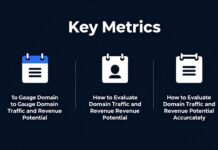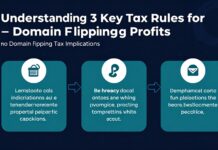What makes a domain premium? This is a question that many entrepreneurs, marketers, and investors are eager to answer. In the vast online marketplace, the value of a domain can vary significantly, but what truly sets a premium domain apart from the rest? In this article, we’ll uncover the hidden value of premium domains and explore the factors that contribute to their allure and desirability.
A premium domain name isn’t just a web address; it’s an asset that can elevate a brand’s visibility and credibility. Short, memorable, and keyword-rich domains have the potential to drive more traffic and improve search engine rankings. But what exactly makes a domain “premium”? Is it the length, the keywords, or perhaps the industry relevance? Understanding these nuances can open up new opportunities for businesses looking to establish a strong online presence.
Imagine owning a domain name that not only captures the essence of your brand but also resonates with your target audience. The right domain can lead to increased organic traffic, higher conversion rates, and ultimately, greater success. So, how can you identify a premium domain that aligns with your vision? Join us as we dive deep into this intriguing topic and reveal the secrets behind identifying and leveraging the true value of a premium domain name. Whether you’re starting a new venture or looking to invest, knowing what makes a domain premium is essential. Get ready to discover its hidden value today!
Unlocking the Secrets: 7 Key Factors That Define a Premium Domain Name
When it comes to the world of domain names, many people often wonder what makes a domain “premium.” Are they just a fancy marketing term, or do they hold real value? Unlocking the secrets behind premium domains can be beneficial for anyone looking to make a mark online. In this article, we explore seven key factors that define a premium domain name and what gives them their hidden value.
1. Length Matters
Shorter domain names usually have a higher perceived value. A domain with only one or two words is easier to remember and type. For instance, domains like “apple.com” or “cars.com” are simple and straightforward. In contrast, something like “bestcarsforfamiliesinnewyork.com” is way too long and hard to remember.
- Short domains are typically:
- Easier to brand
- More memorable
- Better for SEO purposes
2. Keyword Relevance
A premium domain often includes popular keywords that are relevant to the industry. If your domain has a keyword that people are actively searching, it can help in search engine rankings. For example, “NewYorkPizza.com” is more relevant and valuable than “BestFoodNYC.com,” even though both could be used for a pizza restaurant.
- Keywords can:
- Help you rank higher in search engines
- Attract more organic traffic
- Make the domain more appealing to potential buyers
3. Extension Type
The domain extension can affect value too. While “.com” domains are the most sought after, other extensions like “.org” or “.net” can also be valuable, but typically less so than “.com.” Some newer extensions like “.tech” or “.design” are gaining popularity but still might not have the same authority.
- Common domain extensions ranked by value:
- .com – Most valuable
- .org – Good for non-profits
- .net – Used for tech-related businesses
- .info – Often less valuable
- .co – Popular among startups
4. Brandability
A premium domain name is often brandable. This means it’s unique enough to stand out but simple enough to be easily pronounced and remembered. Think about names like “Google” or “Zappos,” which don’t directly describe their services but are memorable and catchy. A name that’s easy to spell and pronounce can lead to better brand recognition.
- Characteristics of brandable domains:
- Unique and distinctive
- Short and easy to spell
- Evokes positive feelings or associations
5. Market Demand
The demand for specific names or keywords can greatly affect a domain’s value. If a domain name is sought after in a growing industry, its value can skyrocket. For example, domains related to cannabis or tech startups have seen a surge in demand recently.
- Factors influencing market demand:
- Current trends in technology
- Popularity of niche markets
- Seasonal or event-based interest
6. Historical Significance
Sometimes, a domain name can carry historical significance that adds to its value. If a domain has been previously owned by a well-known brand or company, it may have built existing traffic or backlinks that enhance its worth. For instance, “MySpace.com” still holds some value due to its past fame, even if it’s not in active use anymore.
- Why historical significance matters:
- Existing traffic can lead to immediate value
- Backlinks from other sites can improve SEO
- Recognition from past use can boost brand credibility
7. SEO Potential
Last but not the least, the SEO potential of a domain name can play a crucial role in its premium status. If the domain has a history of strong performance in search engine rankings, it can be seen as more valuable. An established domain can have existing backlinks and authority, which new domains lack.
- SEO factors to consider:
- Backlinks from reputable sites
- Domain age and history
- Previous search engine rankings
In summary, understanding what makes a domain name premium can provide valuable insights for anyone looking to enter the online marketplace. Whether it’s the length of the name, its keyword relevance, brandability, or even historical significance, each factor contributes to the overall value. As the digital landscape continues to evolve, recognizing these characteristics could help you make informed decisions when investing in domain names. So, if you’re in the market, keep these factors in mind to unlock the hidden value of premium domains today!
The Hidden Value of Premium Domains: Why Investing in Them Can Boost Your Online Presence
In the digital age, establishing a strong online presence is crucial for businesses and individuals alike. One of the most overlooked factors in achieving this is the choice of a domain name. Many people don’t realize that premium domains can carry significant hidden value, and investing in one could be the key to boosting your online visibility. So, what makes a domain “premium”? Let’s dive into the characteristics that set premium domains apart from standard ones and uncover their worth.
What is a Premium Domain?
A premium domain is typically defined by its length, memorability, and keyword relevance. Domains that are short, catchy, and easy to spell usually fall into this category. They often feature popular keywords that can enhance search engine optimization (SEO) efforts. Some characteristics of premium domains include:
Shorter Length: Generally, the shorter the domain, the more premium it is. A domain like “Cars.com” is much more valuable than “BestAffordableCarsInNY.com.”
Keyword Rich: Domains that contain keywords which people often search for can rank higher in search engines. For instance, “NewYorkPizza.com” could attract more traffic than “NYPizzaLovers.com.”
Brandability: A premium domain should be unique and easy to remember. It should resonate with the target audience, making it easier to establish a brand identity.
TLD Selection: Top-Level Domains (TLDs) like .com, .org, or .net are often seen as more premium than others like .info or .biz.
The Financial Aspect of Premium Domains
Investing in premium domains can be a smart financial decision. The price of these domains can vary significantly, ranging from a few hundred to thousands, or even millions of dollars. Here’s what you should know about the financial implications:
Resale Value: Premium domains can appreciate over time. If you purchase a domain for $1,000 today, it might sell for $10,000 or more in a few years, if the demand increases.
Brand Equity: Having a premium domain can lend your business credibility. Customers are more likely to trust a brand with a straightforward and relevant domain name.
Reduced Marketing Costs: With a keyword-rich domain, you may spend less on marketing and SEO. The domain itself can drive organic traffic, reducing your need for paid advertisements.
Why Invest in a Premium Domain?
The benefits of investing in a premium domain extend beyond just financial gains. Here are several reasons why you should consider making this investment:
Increased Traffic: A premium domain can attract more visitors naturally. If your domain is memorable, users are more likely to return.
Better SEO Rankings: Google tends to favor shorter, keyword-rich domains in search rankings, which can improve your website’s visibility.
Competitive Edge: Owning a premium domain can give you an advantage over competitors who may have less memorable or longer domain names.
Long-term Investment: Digital real estate, much like physical real estate, can appreciate over time. Investing in the right domain can provide returns that far exceed initial costs.
How to Identify a Premium Domain
It’s not always straightforward to spot a premium domain. Here are some tips to help you identify one:
Research Market Trends: Tools like Google Trends or keyword planners can help identify popular search terms.
Check Domain Availability: Use domain registrars to see if the desired domain is available for purchase.
Evaluate Pricing: Compare prices of similar domains to gauge if the premium domain is worth the investment.
Seek Expert Advice: If you’re unsure, consulting with a domain broker can provide insights into the value of a domain.
Examples of Successful Premium Domains
Many successful companies have made their mark using premium domains. Here are a few examples:
Insurance.com: Sold for $35.6 million, this domain is a prime example of keyword richness leading to high traffic.
VacationRentals.com: Acquired by Expedia for $35 million, highlighting the value in the travel niche.
Voice.com: Sold for $30 million, showcasing the worth of a short, memorable domain in the tech space.
When considering investing in premium domains, remember that the right choice can significantly impact your online presence and success. By understanding what makes a domain premium, you can make informed decisions that align with your goals. Whether for personal branding or business expansion, the potential rewards are massive. Don’t overlook the hidden value that premium domains can offer; they might just be the key to unlocking your online potential.
Premium Domains vs. Regular Domains: What’s the Real Difference and Why It Matters
When it comes to the world of domain names, there’s often confusion surrounding the terms “premium domains” and “regular domains.” Many people don’t realize that these two categories differ significantly, and understanding these differences can make or break a business’s online presence. So, what’s the real difference and why it matters, especially for those looking to invest in their digital future? Let’s dive into it!
What Makes a Domain “Premium”?
A premium domain is one that holds special characteristics that make it more valuable than typical domains. But what does that mean exactly? First off, premium domains are usually short, memorable, and often keyword-rich. This means they are typically easier to remember and can generate more traffic, which is very valuable for businesses.
Some key traits of premium domains include:
- Length: Usually, shorter domains are better. For instance, domains that are one or two words tend to be more sought after.
- Keywords: Domains with popular search terms or keywords are considered premium. For example, “BestPizza.com” is likely more valuable than “PizzaLover123.com.”
- Brandability: A domain that can easily be turned into a brand is considered premium. Think of names like “Airbnb.com” or “Uber.com.”
- Extension: The most common and trusted extension is “.com.” Premium domains often have this extension, while other extensions like “.biz” or “.info” may not hold the same value.
The Hidden Value of Premium Domains
Investing in premium domains can provide hidden values that regular domains simply can’t offer. The main benefits of owning a premium domain include:
Increased Traffic: Premium domains are often easier to remember and more likely to be typed directly into a browser. This can lead to more visits without the need for extensive advertising.
Better SEO: Having a keyword-rich domain can boost search engine rankings, making it easier for potential customers to find you.
Resale Potential: Premium domains can appreciate in value. If you buy a good one, it might be worth a lot more in a few years.
Credibility and Trust: A quality domain name can enhance your brand’s credibility. It shows your customers that you are serious about your business.
Comparing Premium Domains to Regular Domains
To help clarify the differences further, let’s look at a quick comparison between premium and regular domains:
| Feature | Premium Domains | Regular Domains |
|---|---|---|
| Length | Usually short and concise | Can be long and complex |
| Keywords | Often includes valuable keywords | May not include relevant keywords |
| Brandability | High potential for branding | Lower brandability |
| Cost | Generally more expensive | Usually cheaper |
| Traffic Generation | Higher potential for direct traffic | Often requires more marketing efforts |
The Historical Context of Domain Pricing
Understanding how domain pricing evolved can also shed light on the premium vs. regular domain debate. In the early days of the internet, domains were much cheaper and often seen as a novelty. But as the internet grew, so did the value of domains, particularly those that could attract business.
By the mid-2000s, premium domains were already being bought and sold for thousands of dollars. This was a turning point that established the idea that certain domains could be considered assets, much like real estate. Fast forward to today, the market for premium domains has only expanded, and certain domains are selling for millions!
Factors That Determine Domain Value
When evaluating what makes a domain premium, several factors come into play:
- Market Demand: If a domain matches a popular niche or trend, it can skyrocket in value.
- Historical Sales: Past sales of similar domains can influence current pricing.
- Length and Simplicity: As mentioned, shorter and simpler domains tend to be more valuable.
- Potential Use Cases: Domains that can be used across different industries or purposes tend to be seen as more versatile and valuable.
In the end, the distinction between premium and regular domains is a crucial aspect of online business strategy. Whether you’re launching a startup or planning to expand an existing brand, investing in a premium domain could provide you with a significant edge over competitors.
So, if you consider entering the domain marketplace, take a close look at your options. Many people overlook the potential rewards of choosing a premium domain, but they could be the key to unlocking your online success.
How to Spot a Premium Domain: 5 Essential Tips for Savvy Entrepreneurs
When you’re diving into the world of online business, one of the most important assets you can have is a premium domain. But, what does this really means? How do you spot a premium domain? Many entrepreneurs struggles with this question, so let’s break down the essentials. Here’s five tips that savvy business owners should keep in mind when looking for that perfect domain name.
1. Short and Memorable
A premium domain is often short and easy to remember. This is crucial because people tends to forget long or complex names. Think about it – when was the last time you could recall an overly long URL? Exactly.
- Aim for 6-14 characters: The shorter, the better.
- Avoid numbers and hyphens: These can confuse potential visitors.
- Look for catchy phrases or keywords: Something that sticks in the mind.
Examples of memorable domains includes Google.com and Amazon.com. They are short, simple, and instantly recognized.
2. Keywords Matter
Including relevant keywords in your domain can helps with search engine optimization (SEO). A domain that reflects your business or industry is more likely to draw in visitors.
- Industry relevance: If you’re in the fitness niche, a domain like FitLife.com would be more appealing than a random string of letters.
- Brandability: Choose a name that could become a brand itself. Think about how the domain sounds and feels when spoken aloud.
Historical context shows that domains like Hotels.com and Cars.com made it big because they contained clear, relevant keywords. They not only tell you what the site is about but also improves their rankings on search engines.
3. Extensions Count
The domain extension, or top-level domain (TLD), can also indicates whether a domain is premium. While .com is the most recognized and trusted extension, there are others that can be valuable too.
- .com: The gold standard, associated with businesses.
- .org: Often used by non-profits but can adds credibility.
- .net: Common for tech companies but less desirable than .com.
You might also want to check out newer TLDs like .tech or .design if they fits your brand. Just be careful, some TLDs are seen as less credible.
4. Age and History
An older domain can have significant value due to its age and history. Search engines often favor established domains. So, it can be beneficial to check the domain’s age.
- Use tools like WHOIS to find out when the domain was registered.
- Look for a clean history: A domain with a bad reputation can hurt your business.
For example, if a domain has been around for over a decade and has no history of spam or penalties, it could be a goldmine for your venture.
5. Brand Potential
Lastly, a premium domain should have strong brand potential. This means it should be unique enough to stand out in a crowded market.
- Distinctiveness: Make sure your domain isn’t too similar to competitors.
- Visual appeal: It should look good in logos and marketing materials.
- Social media availability: Check if the name is available across major social platforms.
A domain like BlueApron.com not only encapsulates the service it offers but also possesses a unique ring to it, making it easier to market.
Hidden Value of Premium Domains
When you invest in a premium domain, you might be surprised by its hidden value. This can include:
- Higher resale value: Premium domains can appreciate over time.
- Increased traffic: A catchy name is more likely to be typed directly into a browser.
- Better conversion rates: People trust recognizable names.
In the end, spotting a premium domain is not just about finding a name; it’s about uncovering an asset that can amplify your business’s potential. Whether you’re a budding entrepreneur or a seasoned business owner, understanding these critical elements will help you navigate the domain marketplace. So take your time, do the research, and make an informed decision. The right domain name could be the key to your success!
The ROI of Premium Domains: 3 Compelling Reasons to Invest in Your Digital Future
In the ever-evolving world of digital real estate, the concept of premium domains has gained significant attention. The ROI of Premium Domains: 3 Compelling Reasons to Invest in Your Digital Future, What Makes a Domain ‘Premium’? Discover Its Hidden Value Today! These questions linger in the minds of entrepreneurs and investors alike. But what exactly makes a domain “premium”, and why should you consider investing in one? Let’s dive into the hidden value of premium domains and the reasons why they can be a smart investment.
What Makes a Domain “Premium”?
A premium domain is typically defined as a web address that is catchy, easy to remember, and often short. It is basically a digital property that stands out in the crowded online marketplace. Some key characteristics include:
Short and Simple: The best premium domains are usually no longer than two or three words. Think of names like “Facebook.com” or “Google.com.” Short domains are easier to type and recall.
Keyword-Rich: Domains that include popular search terms or keywords relevant to a specific industry can enhance visibility. For instance, “TravelDeals.com” might attract more visitors than “BestTravelOffers.com.”
Brandable: A premium domain should evoke a brand image. It should sound good when spoken and look appealing when written. Names that easily lend themselves to branding have a higher market value.
Top-Level Domains (TLDs): Domains ending in .com historically have been seen as more valuable. However, other TLDs like .io, .co, and .net can also be premium depending on their context.
The ROI of Premium Domains
Investing in premium domains can yield significant returns, and here are three compelling reasons why:
Increased Traffic: A premium domain can drive more organic traffic to a website. With a catchy and memorable domain, users are more likely to remember it, share it, and return to it. This can lead to higher conversion rates and ultimately more sales.
Brand Credibility: Having a premium domain enhances the credibility of a business. Customers tend to trust companies that have professional-sounding web addresses. A premium domain can separate you from the competition and instill confidence in your target audience.
Resale Value: Premium domains can appreciate in value over time. Just like real estate, the right domain can be sold for a profit. Many digital entrepreneurs have flipped domains for thousands, even millions, of dollars. Investing in premium domains is not just about immediate benefits; it’s a long-term strategy for wealth generation.
Examples of Successful Premium Domain Investments
Several businesses have experienced tremendous success thanks to their premium domain choices. Here are a few notable examples:
Cars.com: This domain was purchased for $872 million in 2014. Its simplicity and relevance to the auto industry made it a valuable asset.
Insurance.com: Sold for $35.6 million, it’s one of the most expensive domains ever sold, demonstrating the potential value of a keyword-rich domain in a lucrative industry.
VacationRentals.com: Acquired for $35 million, this domain directly targets a booming sector—travel and accommodation.
Key Takeaways About Premium Domains
- Premium domains are characterized by their simplicity, memorability, and relevance.
- Investing in a premium domain can lead to increased traffic, brand credibility, and significant resale value.
- Historical examples show that premium domains can command high prices in the marketplace.
How to Identify a Premium Domain
When searching for a premium domain, consider these factors:
Length: Aim for two to three words, ideally with fewer than 15 characters.
Relevance: Make sure it aligns with your business or niche.
Market Trends: Research popular keywords and trends in your industry.
Potential for Branding: Can the domain evolve into a strong brand name?
TLD Choice: Opt for .com if possible, but consider other TLDs based on your target audience.
A Quick Checklist for Domain Evaluation
- Is it short and easy to remember?
- Does it contain relevant keywords?
- Can it be easily branded?
- Is the TLD appropriate for your business?
Investing in premium domains is not just about owning a web address; it’s about securing a digital asset that can enhance your brand’s presence and profitability in the online world. By understanding what makes a domain premium and recognizing its potential ROI, you can navigate your digital future with confidence. As the digital landscape continues to expand, the right domain could be your key to unlocking new opportunities and achieving success.
Conclusion
In conclusion, a premium domain stands out due to its memorable, concise nature, often featuring popular keywords that enhance search engine visibility. Factors such as age, extension, and brandability play crucial roles in determining a domain’s premium status. The investment in a premium domain can yield significant returns, as it not only boosts credibility but also drives organic traffic and enhances marketing efforts. As the digital landscape continues to evolve, securing a premium domain can be a strategic move for individuals and businesses alike. If you’re considering a domain purchase, take the time to evaluate these key attributes to ensure you invest in a name that aligns with your long-term goals. Don’t wait—start your search for the perfect premium domain today and elevate your online presence to new heights.













